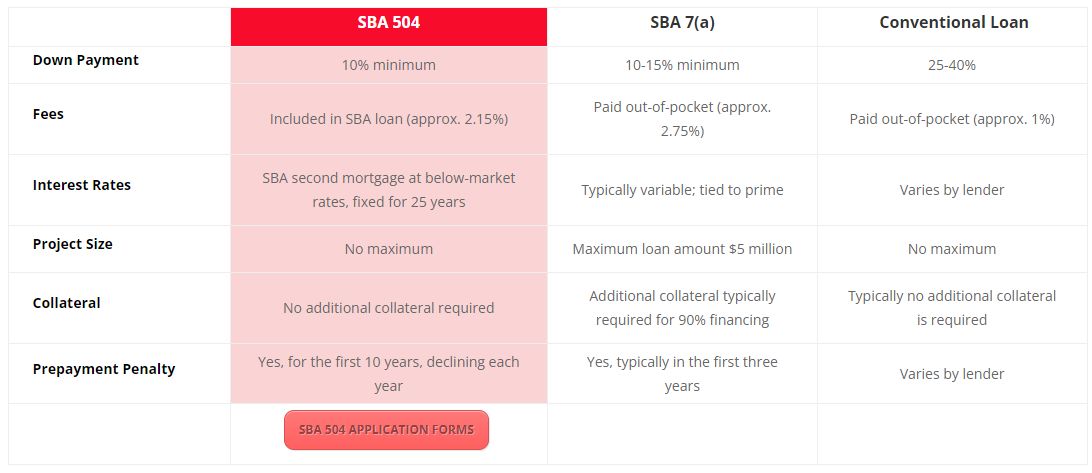When seeking financing for growth or capital improvements, small business owners often look toward the Small Business Administration’s (SBA) loan programs as a solution. The SBA 504 and the SBA 7(a) loan programs are two such options that cater to different needs and are structured uniquely to assist businesses in various situations. Understanding the differences between them is crucial to making an informed decision that aligns with a company’s specific needs.
The SBA 504 loan is designed to aid in the purchase of major fixed assets, such as real estate or heavy equipment, typically involving a lower interest rate and longer repayment terms. Conversely, the SBA 7(a) loan is more versatile, covering a wide range of business expenses including working capital, refinancing debt, and purchasing inventory, but with slightly different fee structures and terms. Determining the right fit depends on the business’s financial state, the intended use of funds, and qualification criteria.
Key Takeaways
- SBA 504 and 7(a) loans provide vital resources for small businesses with varying needs.
- The choice between loans depends on the usage, from purchasing real estate to covering operational costs.
- Loan terms, including interest rates and repayment plans, are key differentiators affecting the decision.
Understanding SBA 504 vs. 7(a) Loan Structures
When business owners consider financing options, knowledge of the specific structure and components of SBA 504 and SBA 7(a) loans is critical for making an informed decision that aligns with their needs.
Overview of SBA Loan Programs
Small Business Administration (SBA) loan programs are designed to assist the growth and development of small businesses in the United States. They are known for favorable terms, such as lower down payments and longer repayment terms compared to conventional loans. SBA 504 loans are intended for purchasing major fixed assets, while SBA 7(a) loans are more flexible and can cover a variety of business expenses.
Key Features of the SBA 504 Loan
SBA 504 loans are delivered through a collaboration between Certified Development Companies (CDCs) and third-party lenders, typically banks. The structure generally involves:
- A loan from a bank covering 50% of the project cost
- A CDC loan for 40%, backed by a 100% SBA guarantee
- The borrower contributing the remaining 10% as a down payment
These loans are best suited for the acquisition or improvement of real estate, machinery, or equipment. They offer fixed-rate loans with predictable interest rates, making them a stable financing option for qualifying projects.
Key Features of the SBA 7(a) Loan
Contrastingly, SBA 7(a) loans offer a breadth of versatility for various business needs ranging from working capital to debt refinancing. These loans are not constrained by a partnership with CDCs. Lenders provide up to $5 million in funding, with interest rates that can be fixed or variable. Benefits of 7(a) loans include:
- Lower down payments and longer repayment periods than conventional loans
- Usage for short and long-term working capital, refinancing, and purchasing equipment or real estate
SBA 7(a) loans offer flexibility, making them a valuable option for businesses with generalized financing needs. Their structure caters to a broad range of business activities, providing a versatile solution for eligible small businesses seeking financial support.
SBA 504 vs. SBA 7(a) Loans Comparison

Eligibility and Application Process
When considering a loan through the Small Business Administration (SBA), it is crucial to understand the eligibility and application process. This section details the requirements for the SBA 7(a) and 504 loan programs, the necessary documentation, and the steps involved in applying.
Qualifying for an SBA Loan
To qualify for an SBA loan, a business must meet the eligibility requirements set by the SBA. They must be a small business as defined by SBA standards, operate for profit in the United States, and have reasonable owner equity to invest. For an SBA 7(a) loan, the business should demonstrate a need for funds and a sound business purpose. The 504 loan program is more specific, often utilized for real estate and equipment, and requires that the assets being financed serve as collateral.
Gathering Required Documentation
Documents required may vary between the SBA 7(a) and 504 loan programs. However, generally, applicants will need to prepare:
- A detailed business plan that outlines the business’s objectives and strategies.
- Comprehensive financial statements to validate the business’s financial resources and health.
- Records of personal and business credit scores.
Understanding the Application Steps
The application process for SBA loans involves several key steps:
- Contacting an SBA-approved lender to discuss the loan and receive guidance.
- Submission of the SBA loan application along with all required documentation.
- Approval process where the lender reviews the application and makes a decision.
Businesses looking to apply should have a thorough understanding of their needs and a well-prepared case to increase their chances of getting approved.
Comparing Costs and Benefits
When comparing the SBA 504 and SBA 7(a) loan options, businesses must closely evaluate costs including interest rates and fees, as well as benefits like loan terms and down payment requirements. Each loan has distinct advantages, but also specific criteria that may influence the final financial impact on your business.
Interest Rates and Fees
The SBA 7(a) program offers both fixed and variable interest rates, which might be higher than the 504 loan rates. The 7(a)’s fees can be substantial and vary depending on the loan amount; for instance, loans above $350,000 come with an SBA guarantee fee SBA 7(a) fee structures. On the other hand, the SBA 504 loan rates are generally below-market, fixed rates, with fees approximately 3% of the 504 loan portion or about 1.5% of the total financing package SBA 504 fee specifics.
Loan Term Considerations
Maturity terms are a crucial aspect of choosing between these two loans. The SBA 7(a) has a maturity term of up to 25 years for real estate and up to 10 years for equipment or working capital. SBA 504 loans are amortized over 25 or 20 years for real estate and 10 years for equipment SBA loan maturity terms.
Assessing Down Payment and Collateral Requirements
SBA 7(a) loan amounts cap at $5 million and usually require a down payment ranging between 10%-20%, often influencing the required collateral. Collateral is often required and might include assets like real estate or equipment SBA 7(a) loan amount and collateral. The 504 loan, conversely, confines its loan to 40% of project costs, with a down payment as low as 10% from the borrower, and does not necessitate additional collateral beyond the project assets being financed SBA 504 down payment and collateral.
Use Cases for SBA 504 vs. 7(a) Loans
Selecting the right type of Small Business Administration (SBA) loan for your business hinges on the specific needs for capital. The SBA 504 and 7(a) programs cater to different use cases, with the former ideal for major fixed assets and the latter for a variety of general business needs.
Real Estate and Large Fixed Assets
For purchasing commercial real estate or funding significant economic development projects, the SBA 504 loan is designed to support these endeavors. This type of loan particularly benefits businesses that need to invest in large fixed assets, which might include buying land, constructing new facilities, or renovating existing buildings. The structure of a 504 loan, with its emphasis on real estate and fixed assets, often makes it the preferred choice for these types of investments.
Working Capital and Equipment Financing
In contrast, a 7(a) loan provides more flexibility and can be used for a variety of purposes, including working capital and equipment financing. Whether a business is looking to purchase new machines or needs funds to keep day-to-day operations running smoothly, the 7(a) program can accommodate these needs. The funds provided can be used for shorter-term business expenses, making the 7(a) loan a versatile tool for business growth and operational stability.
Refinancing Existing Debt
Both 504 and 7(a) loans can be used for refinancing existing debt under certain conditions. If a business is looking to refinance for the purpose of growth or to improve cash flow, a 7(a) loan serves well, offering terms that may be more favorable than the original debt. However, a 504 loan can also be considered for debt refinancing, especially if it’s related to upgrading equipment or facilities, which can lead to improved operations and long-term economic development.
Frequently Asked Questions
In this section, detailed information about the Small Business Administration’s 504 and 7(a) loans is provided to answer common questions and clarify program specifics.
What are the eligibility requirements for the SBA 504 loan program?
The SBA 504 loan requires applicants to operate for-profit, have a tangible net worth of less than $20 million, and an average net income of $6 million or less after federal income taxes for the preceding two years. Loans are for business growth and job creation.
What are the interest rates currently offered for SBA 504 loans?
Interest rates for SBA 504 loans are typically below market rates and are fixed for the life of the loan. Rates are tied to an increment above the current market rate for U.S. Treasury issues.
What purposes can SBA 7(a) loan funds be used for?
Funds from SBA 7(a) loans are versatile and can be used for a variety of purposes, including working capital, debt refinancing, and purchasing equipment, real estate, or inventory.
How do the maximum loan amounts compare between the SBA 504 and SBA 7(a) programs?
SBA 504 loans can have a maximum loan amount that typically tops out around $5 million for most businesses but can go up to $5.5 million for manufacturing and certain energy-related projects. SBA 7(a) loans have a maximum of $5 million.
Can an SBA 504 loan be utilized for the acquisition of an existing business?
No, an SBA 504 loan cannot be used for purchasing an existing business. Its use is primarily for purchasing or improving land and buildings, constructing new facilities, or purchasing long-term machinery and equipment.
What collateral is required for securing an SBA 7(a) loan?
SBA 7(a) loans require adequate collateral, which could include business assets,commercial and personal real estate, equipment, and receivables, though lenders will not decline a loan if inadequate collateral is the only unfavorable factor.


